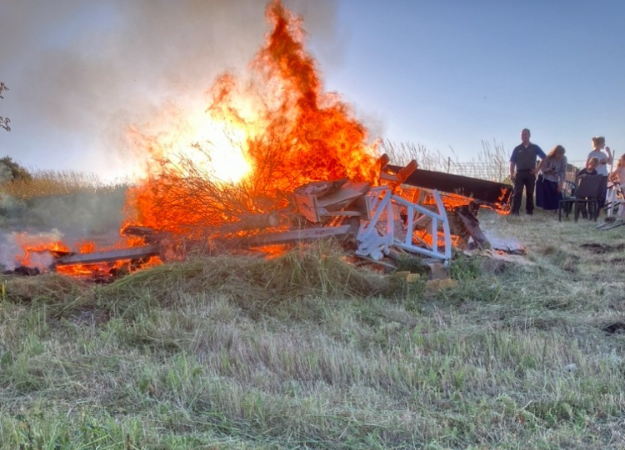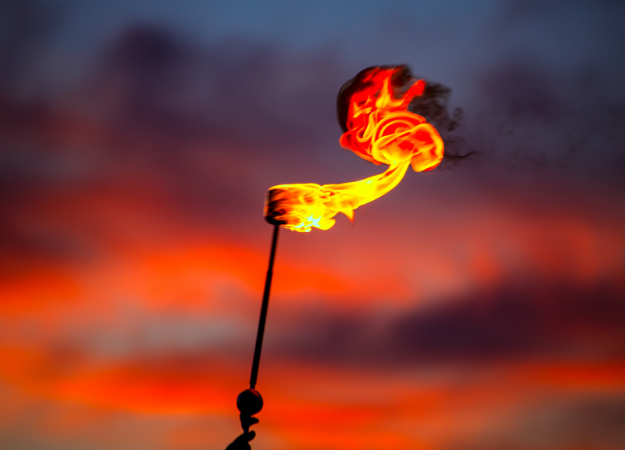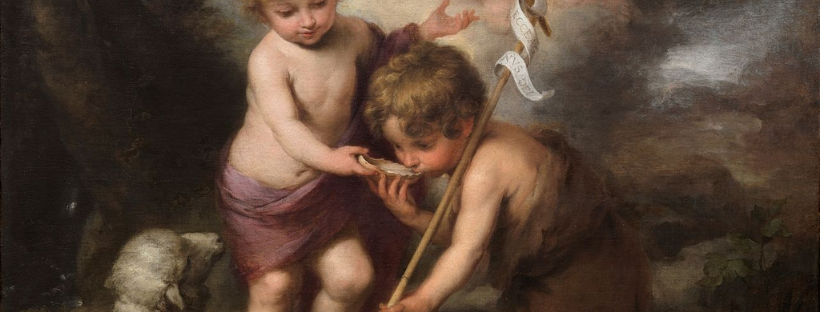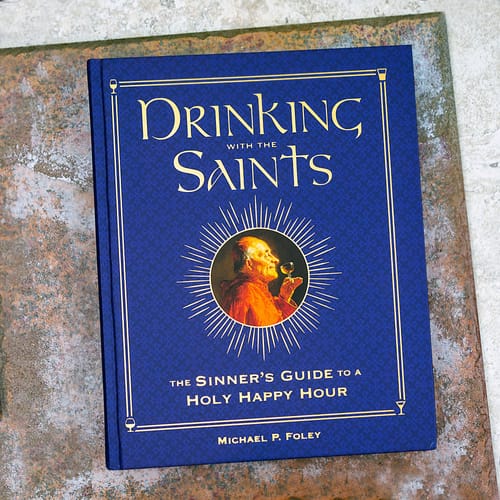Don't miss your chance to invest in 'Fabiola'!
Visit our crowd-funding page for our new production, "Fabiola"!
- Home
- Heroes From History
- St. John the Baptist
Why Do We Celebrate The Nativity Of John the Baptist With Bonfires?
The feast of the nativity of St. John the Baptist, June 24th, is a special day to look forward to. Children love to remember the great day that comes every year when all the furniture and other items that didn’t make it last year is burnt along with any sacramentals in a great bonfire.

But why do we celebrate the nativity of John the Baptist?
It is not common to celebrate the birthdays of the saints. In fact there are only three birthdays on the Liturgical Calendar: Our Lord’s, Our Lady’s and John the Baptist’s.
Usually we celebrate the day that a saint dies as we recognize that day as being more important than their births because it is death that introduces saints into eternal life.
The reason we celebrate the nativity of John the Baptist goes back to the story of the Annunciation, when the Angel Gabriel came to Mary to announce that she would become the Mother of God. After Mary graciously accepting the great honor, Gabriel the Archangel also told Mary that her cousin Elizabeth was also to have a son. The conception of this child was a miracle in itself as Elizabeth was well past the age of childbearing.
Mary did not hesitate.
She did not think of herself a mite, but rushed to the home of Elizabeth to help the elderly pregnant woman.
We can imagine Elizabeth with her wash out in the Palestinian heat when she heard the footsteps of Mary approaching. What was in the old woman’s hand dropped. When her eyes met the welcome figure of her young cousin, the child in Elizabeth’s womb leapt for joy.
At that moment, the soul of the child, John the Baptist, was washed clean of Original Sin—the sin that every human being inherits from our first parents Adam and Eve.
There are only three humans who have ever been cleansed of this sin before their births. Both Our Lord and Our Lady were conceived without Original Sin.
Mary was preserved because God would not let the temple wherein His Son would be incarnated be stained with sin. Our Lord was God and was thus incapable of bearing Original Sin on His soul.
But John the Baptist was conceived with Original Sin, but was cleansed of this sin at the Visitation when his mother Elizabeth heard the voice of Mary. He was thus born without Original Sin and that is why we celebrate his birthday as well as the day of his martyrdom.
John the Baptist: Forerunner Of Christ And The One Who Paved The Way Of The Light
After expounding on the great honor given to John the Baptist, you may be now interested in who this man was and why it was necessary that he be free from Original Sin. Many will remember these words from the last Gospel read at the end of every low Mass:
“There was a man sent from God, whose name was John. This man came for a witness, to give testimony of the light, that all men might believe through him. He was not the light, but was to give testimony of the light. That was the true light, which enlighteneth every man that cometh into this world.”(John 1:6-9)
There is a story that I remember from one of the readers I had during school that I did not realize was actually the story of St. John the Baptist, but as I remember it now, I am sure that it was the intention of the author to tell the story of John the Baptist.
Here is the story as I remember it:
Once upon a time, there was a pilgrim that came from a far away land and traveled to Jerusalem. Upon arriving in Jerusalem, the pilgrim entered a great basilica that marked a place where Our Lord had been during His life on earth.
The pilgrim had with him a torch. Taking the torch, he lit it by the sanctuary lamp above the altar in the basilica. This was a sacred fire which he would bring to light the sanctuary lamp back in his hometown.

Day and night, the pilgrim protected the flame from all the elements which constantly seemed bent on putting out the little flame. Finally, he neared his hometown.
As night-time approached, the pilgrim looked for a place to stay. He knocked on the door of a rather shabby abode. The careworn and cold face of a woman answered the door. Her face lit up when she saw the pilgrim’s lighted torch.
The pilgrim asked the poor woman if he might stay with her for the night. She agreed, but only asked that he return the favor by lighting her fire with his torch.
The pilgrim looked at the torch for a moment.
He thought about how much care he had undergone and how jealously he had guarded his torch to painstakingly keep the flame alight through all his travels. He looked now into cold face of the poor woman. He knew what was right and, putting aside his protective feelings for the sacred flame, helped the poor woman light the fire. The dry wood caught the flame immediately and was soon warming the entire room.
Early the next morning, the pilgrim started on the last leg of his journey to the parish of his hometown to light the sanctuary lamp with his sacred flame from Jerusalem. As he traveled he again thought about his pilgrimage and how well he had done bringing the flame so far and keeping it lit through the long journey.
He thought with joy now on how his sharing it last night had brought such comfort to the kind woman. While the pilgrim was lost in thought, a storm began to gather.
Perhaps the pilgrim’s being so close to his destination lulled him into a false sense of security or perhaps he was too deeply absorbed in thought.
Whatever the reason, the pilgrim had let down his guard and only noticed the storm when it was too late to find a shelter to protect his sacred flame from the weather. Now in a panic, the pilgrim did his best to shield the flame from the onslaught of rain. He was doing well when suddenly one giant drop of rain fell onto the torch and squelched the flame.
Despair gripped at the pilgrim’s heart.
For a moment he stood and stared at his dear companion the torch. The torch seemed equally astonished and the pilgrim fancied a bit of a disappointed look staring back at him on the torch. How was it that he failed now when he was so close to his destination?
St. John's nativity is celebrated 6 months before Christmas during the summer solstice.
St. John says:
"He must increase, but I must decrease."
From this time forward, in the western hemisphere the sun gives less light each day.
In December after the winter solstice the sun's light grows more and more each day. St. John decreases with the sun and Our Lord arrives on the darkest night and the light then increases.
Sadly the pilgrim sat down on a stone nearby. In the pouring rain, he sat there and thought about his failure.
Then, quietly, like the voice of reason usually is when it first speaks, a new thought occurred to him.
Had he not used that flame to enkindle a fire in a poor woman’s home not far?
Was it not still cold and very likely that the fire was still burning?
Driven forward by his newfound hope, the pilgrim leapt to his feet and rushed back to the woman’s house, giving her quite a start when he flung the door open and asked if his flame was still burning on the hearth.
What joy filled both the pilgrim and the torch as they were reunited with their sacred flame. And now with great care, the pilgrim carried the flame to his parish and lit the sanctuary lamp there.
The pilgrim and the torch learned an important lesson—they were not the light but were to give testimony of the light. "The life was the light of men. And the light shineth in darkness, and the darkness did not comprehend it."
Bonfires, Drinks And Other Customs To Celebrate St. John the Baptist's Nativity

It is a tradition to burn broken furniture, sacramentals and holy things on this day in a great bonfire. If a priest is available, he can bless the fields and go through them with a torch from the fire.
Saving sacramentals throughout other seasons and holidays that need destroyed as well as furniture and a brush pile is a great way to celebrate this solemnity with your family at home. The size of the bonfire helps with not only making a solemn affair of burning the sacramentals, but also ensures that even materials that wouldn’t normally burn are gone because of the high heat of the fire.
If you are lucky enough to have a priest attend your gathering, he can bless your fields or garden before it’s time to light the bonfire.
St. John's Wort, which is named after the saint, not only proclaims the opening of summer but it also has its own connection to this feast. Since the Middle Ages people have decorated their doorways and windows with these little yellow flowers to keep evil spirits away.
So if you happen to have St. John's Wort you should bring some in and decorate the home.
Michael Foley suggests several drinks to aid in the celebration. Since St. John the Baptist is the patron saint of Puerto Rico, celebrate with a Piña Colada!
There is also a number of drinks that share the name of the saint such as the "San Juan".
Or, recall the diet of locust the Baptist ate in the dessert and shake up a "Grasshopper"!
More of a wine person? Try "Muscat de Saint-Jean-de-Minervois". Also fitting in with St. John's diet, this wine has a honey aroma.
Try Drinking with the Saints to experience cocktails and drinks for every feast day in the year. This is a truly indispensable book for party fun. Some of our favorite drinks are the “Scapular” and the Kiddy-Car, which we’ve made a variation of and renamed the “Drunken Duncan”.
Subscribe To Our FREE Email Newsletter:
Awards:


#RebuildChristianArt Blog
An aid for families encouraging the reconstruction of the social fabric by sparking interest in Christian art and culture. Find beautiful novels, films, music, food and customs.
What's New At The Studio
-
Happy New Year From The Bowens and The Industrious Family Team
Jan 02, 26 09:07 PM
-
Jordan Sax Returns with Music for Our 2025 Christmas Special
Dec 31, 25 12:28 PM
-
Thank You for Celebrating Christmas With Us!
Dec 30, 25 01:48 PM

